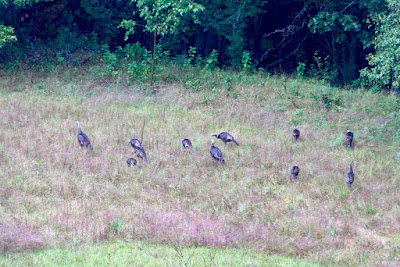Early this morning, but after the dogs’ walk, we had thunder and lightning that, over an hour or two, delivered about a quarter inch of much needed rain. Many trees are showing early color with greens turning into yellows. Lower leaves on a maple sapling in the back yard are turning red, but there’s no red on the throats of the hummingbirds we’ve seen the past few days. Only gray throats around the feeders is a sign the male ruby-throated birds have headed south. Females and youngsters will follow in a few weeks.
 |
| backyard: wild turkeys
Photo by J. Harrington
|
Much of our engagement with our place is either entertainment like watching birds at the feeders or wildlife crossing the yard, or chores like mowing the grass or trapping pocket gophers so their mounds don’t wreck the mower. When we first moved here, we tried planting a vegetable garden. Horseflies, deer flies, sandy soil and similar detractions deterred us from continuing that “hobby.” Our dependence on ecosystem services is indirect, tenuous, or both. Yes we need fresh air to breathe and clean water to drink. We have little, if any, control over significant destruction of forests in the Amazon or the North Woods. We have actively helped oppose hard rock mining in Minnesota, but that’s as much on principle as based on a direct relationship with the resources that would be affected. We don’t eat much wild rice nor vacation “up North” all that often.
On the other hand, we support local and regional food systems as much as we can. That also contributes to the local economy and helps protect local water quality. But, all in all, our dependence on “nature” while as pervasive as it was for those who lived here prior to colonization is nowhere near as obvious. I’m rambling about this because I can’t figure out how we get substantially more people to understand and appreciate that we can’t afford to destroy our water supplies so that we can eat, harvest timber or mine metals. I’d happily rely on cast iron fry pans and griddles if we could get rid of PFAS. What I haven’t yet found is a rigorous and reliable way to organize my day to day life so that I can tread lightly. The building industry organized itself into the Green Building Council which brought about standardized criteria in the form of LEED ratings. Can someone work up a comparable set of LIFE ratings? Would enough folks bother to apply such criteria if they existed? Do we need an update to our Original Instructions? And how do we consumers get honest ESG ratings on the producers of our products? There’s lots of advice available, almost all too general or abstract to be applied by ordinary folks who have overly complicated lives to live.
Ledger
Tchaikovsky’s Eugene Onegin is 3,592 measures.
A voice kept far from feeling is heard as measured.
What’s wanted in desperate times are desperate measures.
Pushkin’s unfinished Onegin: 5,446 lines.No visible tears measure the pilot’s grief
as she Lidars the height of an island: five feet.
Fifty, its highest leaf.
She logs the years, the weathers, the tree has left.A million fired-clay bones—animal, human—
set down in a field as protest
measure 400 yards long, 60 yards wide, weigh 112 tons.
The length and weight and silence of the bereft.Bees do not question the sweetness of what sways beneath them.
One measure of distance is meters. Another is li.
Ten thousand li can be translated: “far.”
For the exiled, home can be translated “then,” translated “scar.”One liter
of Polish vodka holds twelve pounds of potatoes.
What we care about most, we call beyond measure.
What matters most, we say counts. Height now is treasure.On this scale of one to ten, where is eleven?
Ask all you wish, no twenty-fifth hour will be given.
Measuring mounts—like some Western bar’s mounted elk head—
our cataloged vanishing unfinished heaven.
********************************************
Thanks for visiting. Come again when you can.
Please be kind to each other while you can.
No comments:
Post a Comment